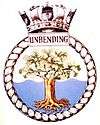HMS Unbending
| History | |
|---|---|
| Name: | HMS Unbending |
| Builder: | Vickers Armstrong, Barrow-in-Furness |
| Laid down: | 30 August 1940 |
| Launched: | 12 May 1941 |
| Commissioned: | 5 November 1941 |
| Fate: | Scrapped May 1950 |
| Badge: |
 |
| General characteristics | |
| Class and type: | U-class submarine |
| Displacement: |
|
| Length: | 58.22 m (191 ft) |
| Beam: | 4.90 m (16 ft 1 in) |
| Draught: | 4.62 m (15 ft 2 in) |
| Propulsion: |
|
| Speed: |
|
| Complement: | 27-31 |
| Armament: |
|
HMS Unbending (P37) was a Royal Navy U-class submarine built by Vickers-Armstrong at Barrow-in-Furness, and part of the third group of that class.[1] So far she has been the only ship of the Royal Navy to bear the name Unbending.
Career
Unbending served in the Royal Navy's Tenth Flotilla under the command of Lieutenant E.T. Stanley.[2] The ship spent most of her wartime career in the Mediterranean, where she sank the Italian merchant ships Alga, Citta di Bergamo, Cosenza and Beppe, the Italian auxiliary minelayer Eritrea and the Italian destroyer Giovanni da Verrazzano. She also sank the Italian ship Lupa II with gunfire. Unbending had first fired two torpedoes but these were evaded. Unbending also damaged the Italian passenger / cargo ship Viminale, the Italian merchant Carlo Margottini (the former Yugoslavian Bled), and the Italian passenger ship Carlo Margottini. This ship ran ashore and is not listed as a war loss so was most likely salvaged and returned to service.
Unbending was the initiator of one of the rare modern-day boarding parties: having surfaced beside a schooner in the gulf of Sfax, Unbending found herself unable to hit the small ship with her deck gun, so a resourceful officer leapt aboard and set fire to the entire ship using only a can of shale oil.[2]
Unbending was sold to be broken up for scrap on 23 December 1949 and scrapped at Gateshead in May 1950.
Notes
References
- "HMS Unbending (P 37)". uboat.net.
- "Ultimatum to Unbroken". British submarines of World War II.
- Colledge, J. J.; Warlow, Ben (2006) [1969]. Ships of the Royal Navy: The Complete Record of all Fighting Ships of the Royal Navy (Rev. ed.). London: Chatham Publishing. ISBN 978-1-86176-281-8. OCLC 67375475.
- Compton-Hall, Richard (2004). Submarines at War 1939-45. UK: Periscope Publishing Ltd. ISBN 1-904381-22-7. Retrieved 2011-01-01.
- Hutchinson, Robert (2001). Jane's Submarines: War Beneath the Waves from 1776 to the Present Day. London: HarperCollins. ISBN 978-0-00-710558-8. OCLC 53783010.